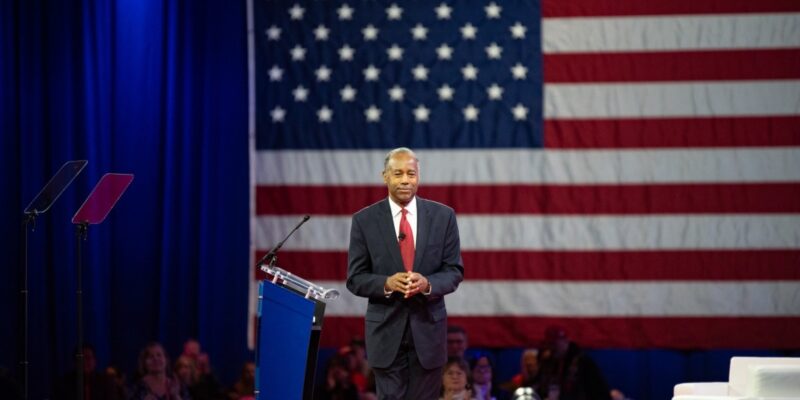
Erstwhile GOP presidential candidate and current vice-presidential hopeful Ben Carson has joined right-wing peers like Speaker of the House Mike Johnson in supporting the end—or at least the rolling back—of no-fault divorce laws across the nation.
“For the sake of families,” the former Secretary of Housing and Urban Development wrote in his book, The Perilous Fight, released Tuesday, “we should enact legislation to remove or radically reduce incidences of no-fault divorce.”
Over the past year, I have been tracking the rise of men on the right, both elected and civilian, who think it ought to be harder to get divorced in this country. These men often cite family values, their religious beliefs, or women’s changing desires to justify rolling back the current no-fault system that exists in all 50 states.
Since 1969, when then–California Gov. Ronald Reagan signed the nation’s first no-fault divorce law—granting couples a separation without having to prove that one side had committed wrongdoing—these statutes have provided a way out of both banal and toxic relationships. Though Reagan, per his son, would later call backing no-fault divorce his “greatest regret” in life, these laws have had a positive impact on women’s lives and autonomy. A 2003 working paper from the National Bureau of Economic Research found that when states allowed one partner alone to push for divorce, there was a 20 percent decline in female suicide. As I have reported previously, no-fault divorce laws are often essential to those attempting to escape domestic violence.
While some people have been clamoring about rolling back no-fault divorce laws for decades—read Sen. Tom Cotton’s 1997 article in the Harvard Crimson for his thoughts on the matter—there has been a marked increase in disdain both online and in places of power, about states’ current divorce laws. These men—Johnson, failed Republican presidential candidate Vivek Ramaswamy, Oklahoma State Sen. Dusty Deevers, Sen. J.D. Vance, right-wing activist and influencer Steven Crowder, and PragerU host Michael Knowles, to name a few—are normalizing attacks on whether and how people should be able to separate.
“The reason this matters is that no-fault divorce legally allows marriages to end much more quickly than in previous decades,” Carson wrote in the book.
Should Carson be chosen as Donald Trump’s running mate, and should he further become second in line for the presidency come November, it’s unclear if and how he’d attempt to limit access to divorce. These kinds of laws are handled state-by-state, and an overwhelming majority of Americans think that divorce is “morally acceptable.”
This isn’t the first time Carson has written about divorce, either.
Throughout Carson’s books, he references difficulties from his childhood. He details growing up in Detroit, speaking fondly of the rug he sat on in kindergarten to learn new songs. “I was an average student, and life was peaceful,” Carson wrote in his 2011 book America the Beautiful.
That changed when he turned eight years old and his parents divorced. According to Carson, “it wasn’t his job that had kept my father away from our family. He had been living a double life for years—complete with a second wife and another set of children.”
He, his mom, and his brother moved to Massachusetts. “There were four grades in each classroom, and all eight grades were taught by only two teachers,” Carson wrote. “By the time … I moved back to Detroit, I had essentially lost a year of school while in Boston, my academic performance lagging far behind that of my new classmates.”
Carson laments seeing his mother Sonya go through this time in his 2007 book Take the Risk. “She suddenly found herself all alone in the world, devastated and disillusioned by the end of her marriage,” he wrote. In a section of his 1992 book Think Big dedicated to his mother, she described the financial difficulties that arose after the divorce. “At one point we did get food stamps, but only for a few months. I wanted to be independent and pay my own way. According to the divorce decree, Mr. Carson was supposed to support our sons, but he provided very little money.”
Fast forward to Carson’s book released this week, in which he writes, “When there are relatively few legal or financial consequences connected with divorce, it’s natural for people to gravitate toward that option when their marriage hits a rough patch.”
“What those people often don’t consider, however,” he goes on, “is the harm—both present and future—inflicted on their children once a divorce is finalized.”















